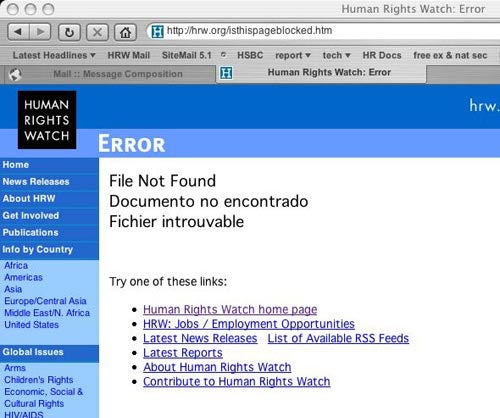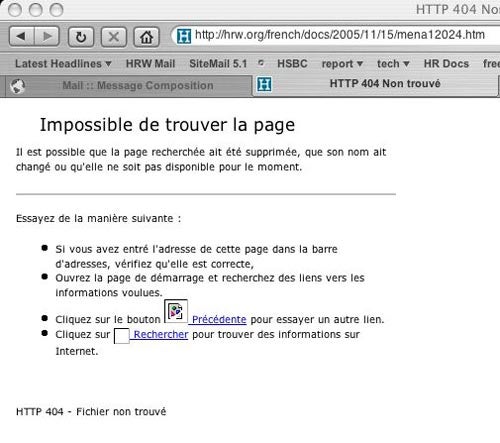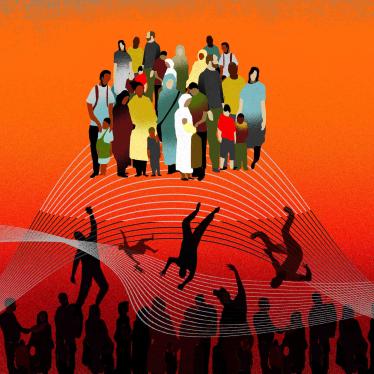The official opening of the diplomatic phase of WSIS began with a clarion call from the president of Switzerland (host of the 2003 Geneva phase of the summit) for respect for free expression.
Those were fighting words. Tunisian television, broadcasting from the conference with a slight delay, quickly cut away to a commentator. President Schmid was well aware of actions in recent days by the Tunisian authorities to break up meetings and discussions by independent Tunisian civil society groups. So was Shirin Ebadi, the Iranian Nobel Prize winner who in her opening address to the Summit called for international monitoring of political repression on the Internet.
Censorship report censored
Tests conducted between 2:30 and 4:30 p.m. using the Internet service provider 3S Global Net found that the French and Arabic press releases for Human Rights Watch’s latest report on Internet freedom in the Middle East were also blocked in Tunis. Users trying to access these pages received a page disguised to look like a French-language Microsoft Internet Explorer error page that read “Impossible de trouver la page” (“Impossible to find the page”), regardless of the browser used or the language of the operating system used. The results were consistent with the blocking behavior exhibited in previous tests, documented in Human Rights Watch’s report, False Freedom: Online Censorship in the Middle East and North Africa.” The English, German, and Farsi-language versions of the press release, and the full report, in English, were available. Arabic and French are the languages most commonly read in Tunisia. The French and Arabic versions of Amnesty International's report on Tunisia were also apparently blocked in Tunis outside the WSIS compound. Amnesty International was also prevented from distributing its November 14 report on Tunisia at WSIS.


The Citizens Summit Rebounds
A reception and press conference held in the afternoon at the Tunis headquarters of the independent Tunisian League for Human Rights became, in effect, the unofficial first meeting of the Citizen’s Summit. Approximately 200 Tunisian and international activists, diplomats and journalists showed up to hear Shirin Ebadi and other notables call for respect for free expression.
Ebadi called for the audience to join her in visiting the group of Tunisian opposition figures who were in their 30th day of a hunger strike. The group—which includes three opposition party activists, a journalist, three human rights lawyers, and a former judge—have been holed up in a downtown office and refusing food to dramatize their demand that authorities end restrictions on freedom of association and of expression, and release Tunisia’s more than 400 political prisoners.
The diplomatic community showed up in some strength at the League’s reception. The mayor of Geneva made a strong statement to the effect that freedom of expression and information is universal and not the domain of any one culture or civilization. U.N. Secretary-General Kofi Annan also sent a statement to the conference expressing his concern for the wellbeing of the hunger strikers. A representative of the European Parliament also expressed strong support for the hunger strikers.
Sharon Hom, the executive director of the New York-based Human Rights in China, was among the many international NGO representatives to express solidarity with Tunisian colleagues seeking the freedom to speak and write on the Internet without interference. She recounted how her organization had been denied accreditation to WSIS under pressure from China, which is a member of the WSIS secretariat. Members of the Chinese delegation expressed surprise to see her when she arrived as an accredited member of the delegation of the Federation Internationale des Ligues des droits de l’Homme.
The mood in the offices of the Tunisian League was exuberant, as activists and delegates to the conference mingled.
Hunger strikes spotlight rights repression
But at Belkis and Sihem Zerrouk’s home in a suburb of Tunis, the mood was grim. Sihem and her 16-year-old daughter Belkis have gone without food or water since November 6 in solidarity with Sihem’s husband Hatem. Hatem is a long-term political prisoner held for his alleged connection to the banned Islamist al-Nahdha Party. Hatem has gone without food and water since November 4. When Tunisian and international journalists and human rights advocates arrived at the women’s home, they found the ubiquitous plainclothes security agents stationed at the corner. Inside, the women lay wasted, near death. Posters calling for Hatem’s release hung behind the bed. Though she clearly was trying to maintain her composure and her dignity, Sihem was wracked by painful spasms and occasionally cried out in pain. Upon seeing the two, a doctor from the LTDH immediately called out for someone to call an ambulance immediately. The mother was suffering from severe calcium deficiencies and might not last the night, he said. Family members tried to put on a brave face, but periodically wiped tears from their eyes and hugged each other for sympathy. Their faces were lined with worry.
Sihem Bensedrine and other visitors from international human rights groups urged the two to end their hunger strikes. They agreed.
Human Rights Watch representatives then paid a visit to the better-known core group of eight hunger strikers at at 23 Mokhtar Attieh Street, a law office converted into a protest headquarters outfitted with rows of beds and photos of political prisoners. The strikers, lawyers Mohamed Nouri, Semir Dilou, Ayyachi Hammami, former judge Mokhtar Yahiaoui, opposition party figures Nejib Chebbi, Hamma Hammami, and Abderraouf Ayadi and journalist Lotfi Hajji, were gaunt and sober. The official press first refused to carry news about the hunger strike, while the private, pro-government papers ran stories attacking the organizers as disloyal Tunisians. Even so, news of their protest had mobilized support from many different groups throughout the country, as well as abroad: four other hunger strikes in sympathy had been organized in Berlin, Paris, London and Geneva. When asked whether the strikers were concerned about international attention to human rights flagging after the conclusion of WSIS, Nejib Chebbi said, “In real terms, this strike has generated a deep and profound movement within Tunisian society as well as in Tunisian communities abroad.”






